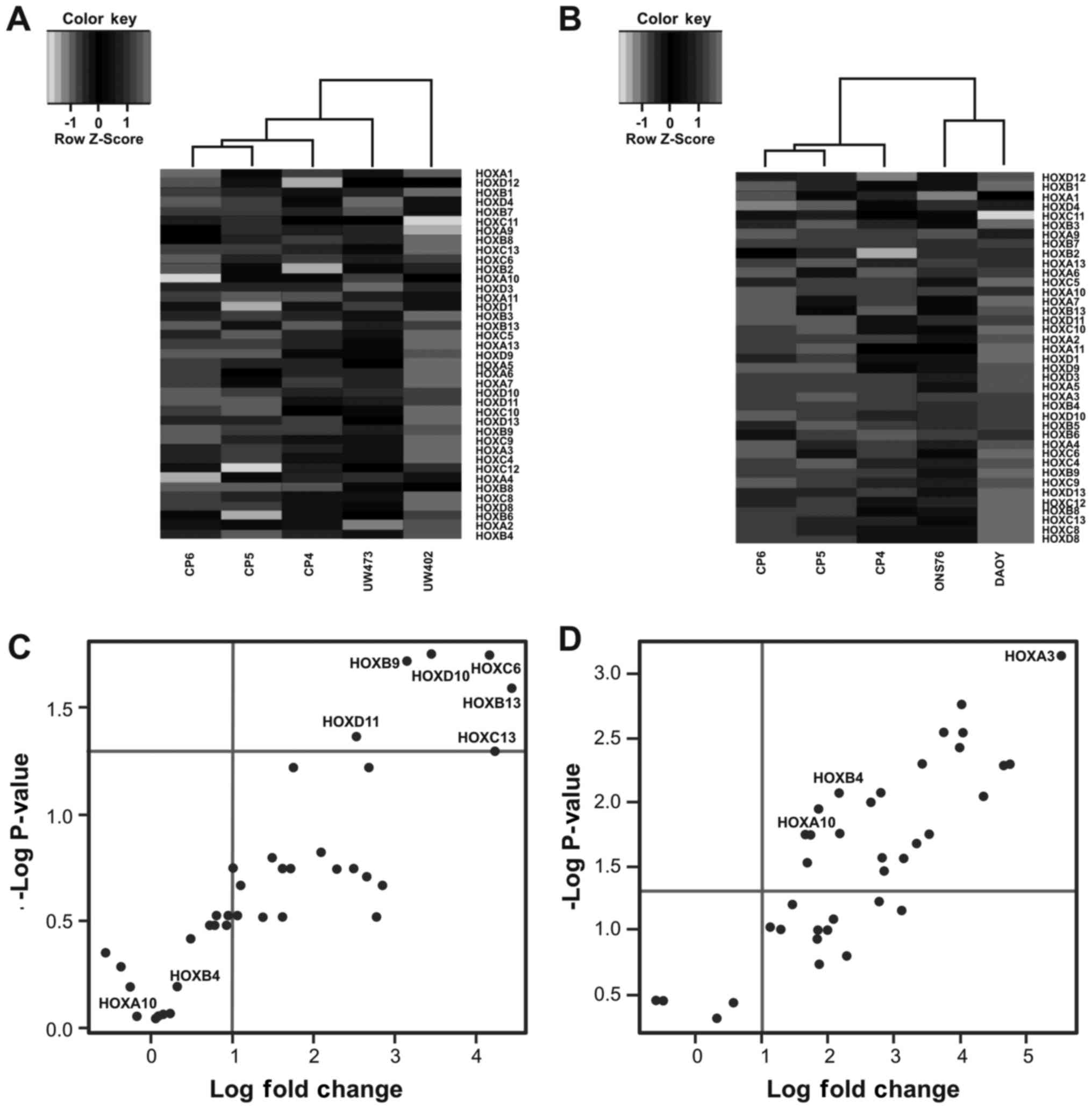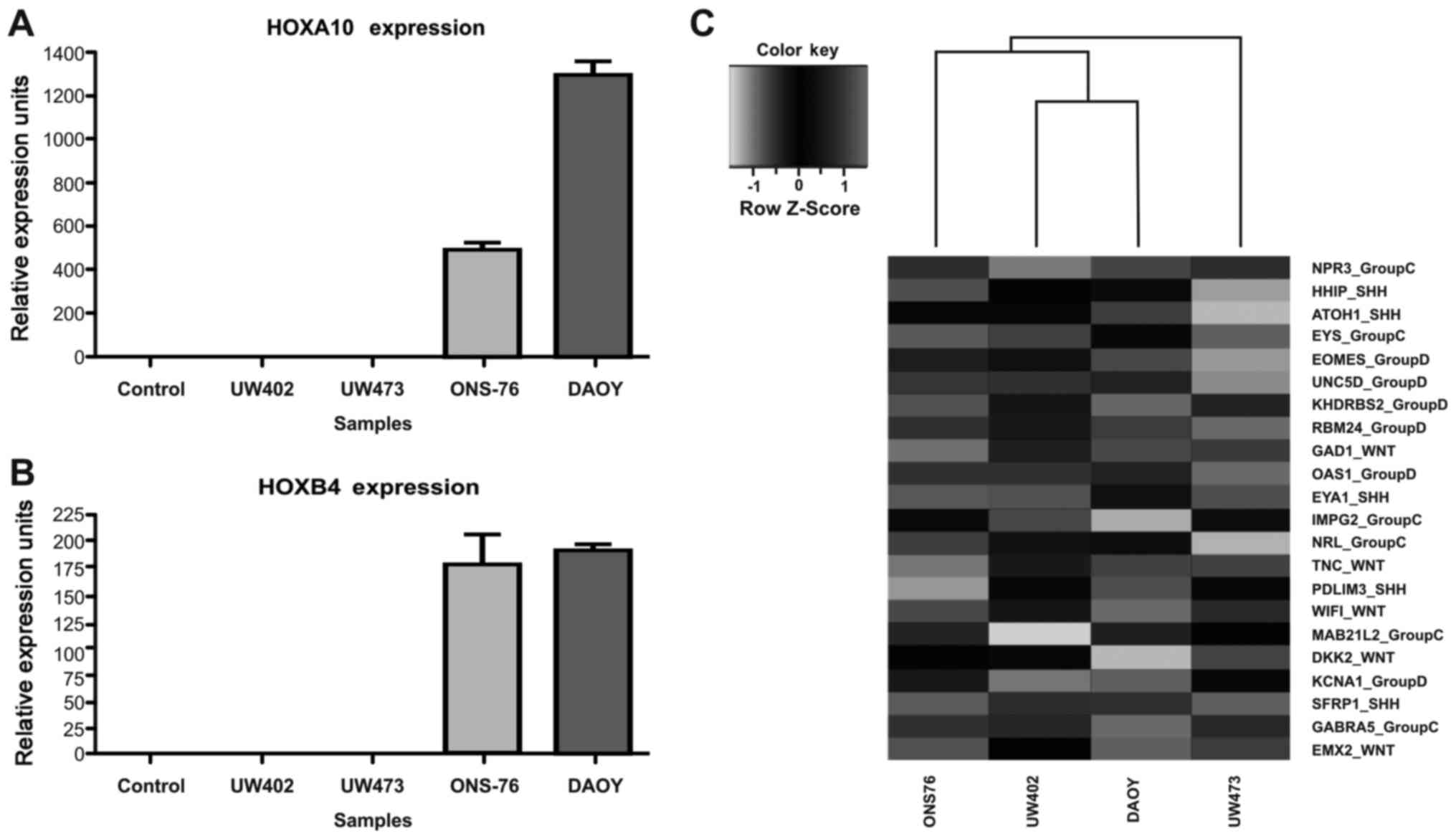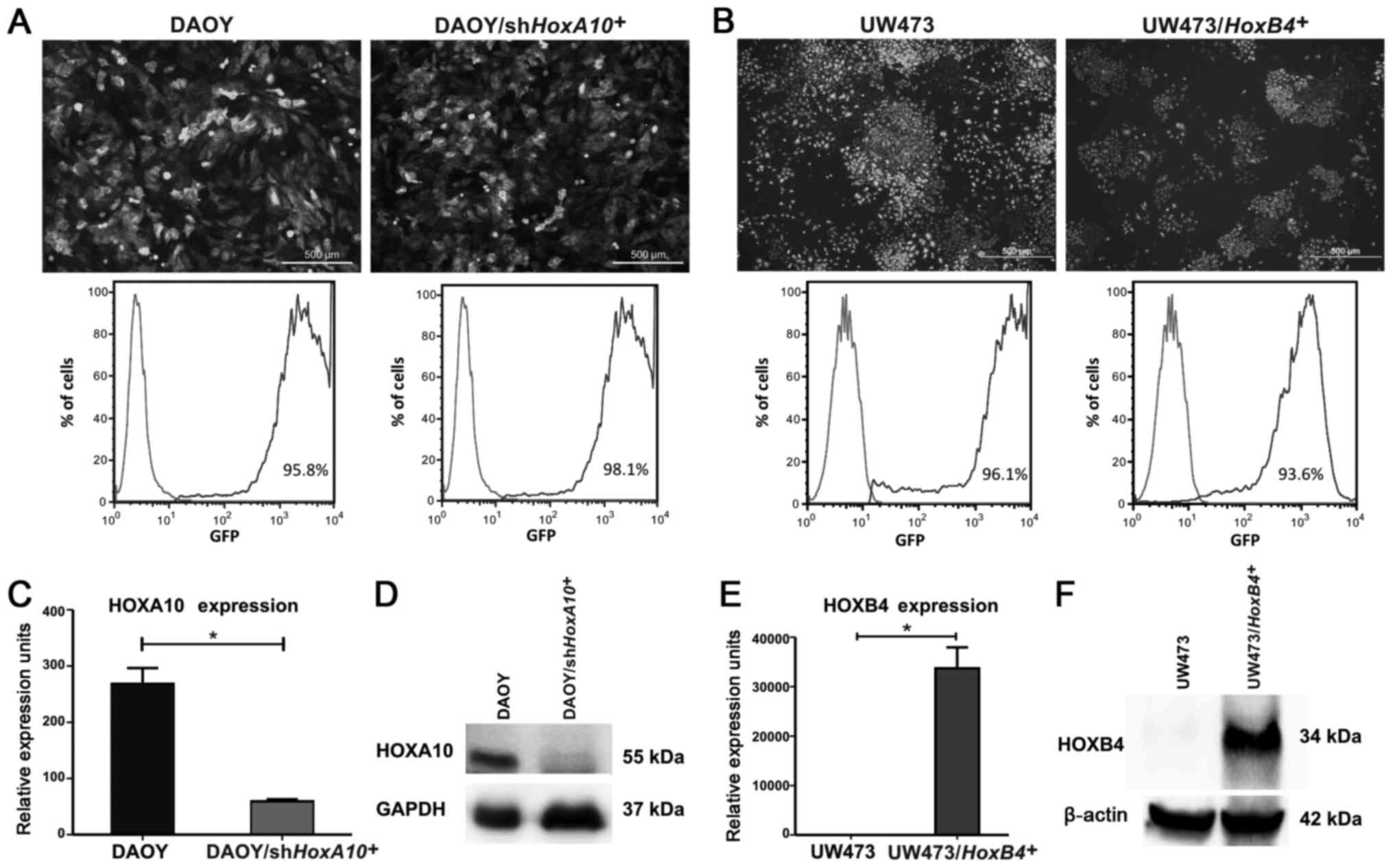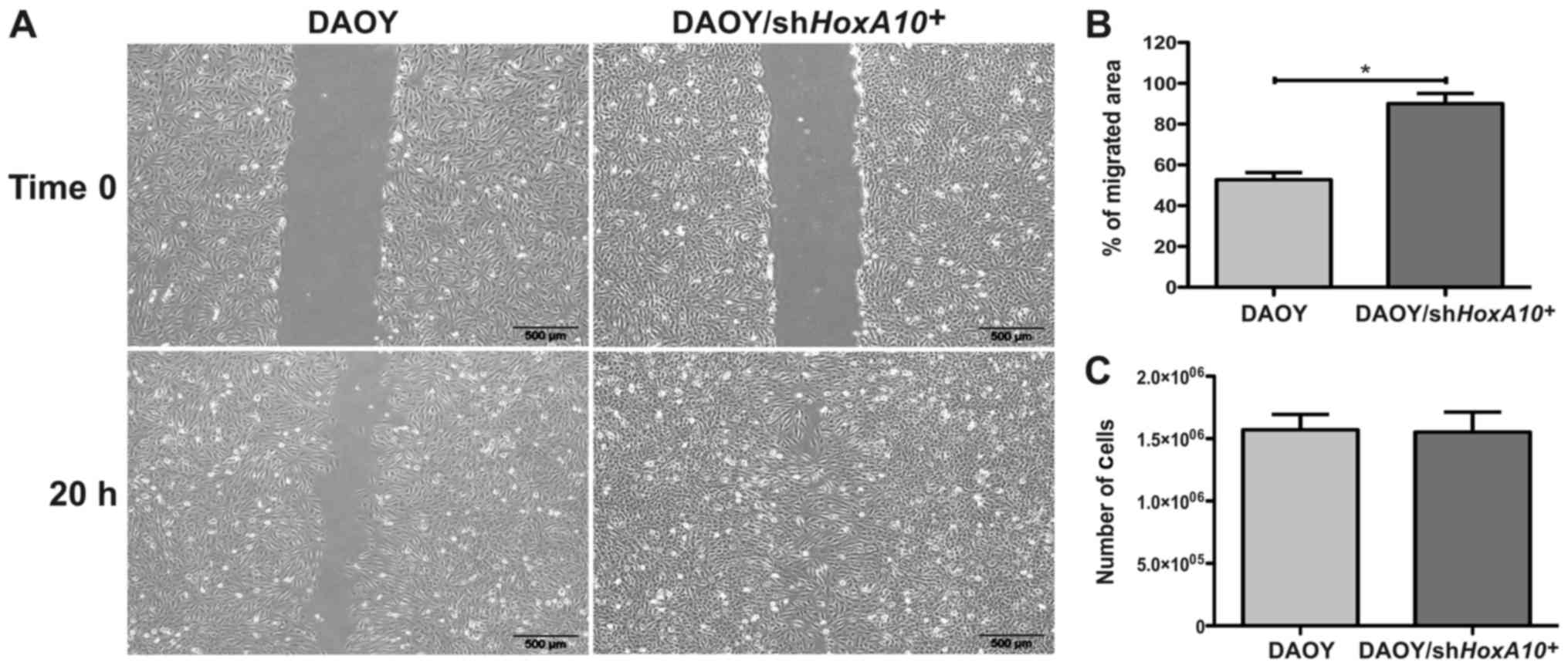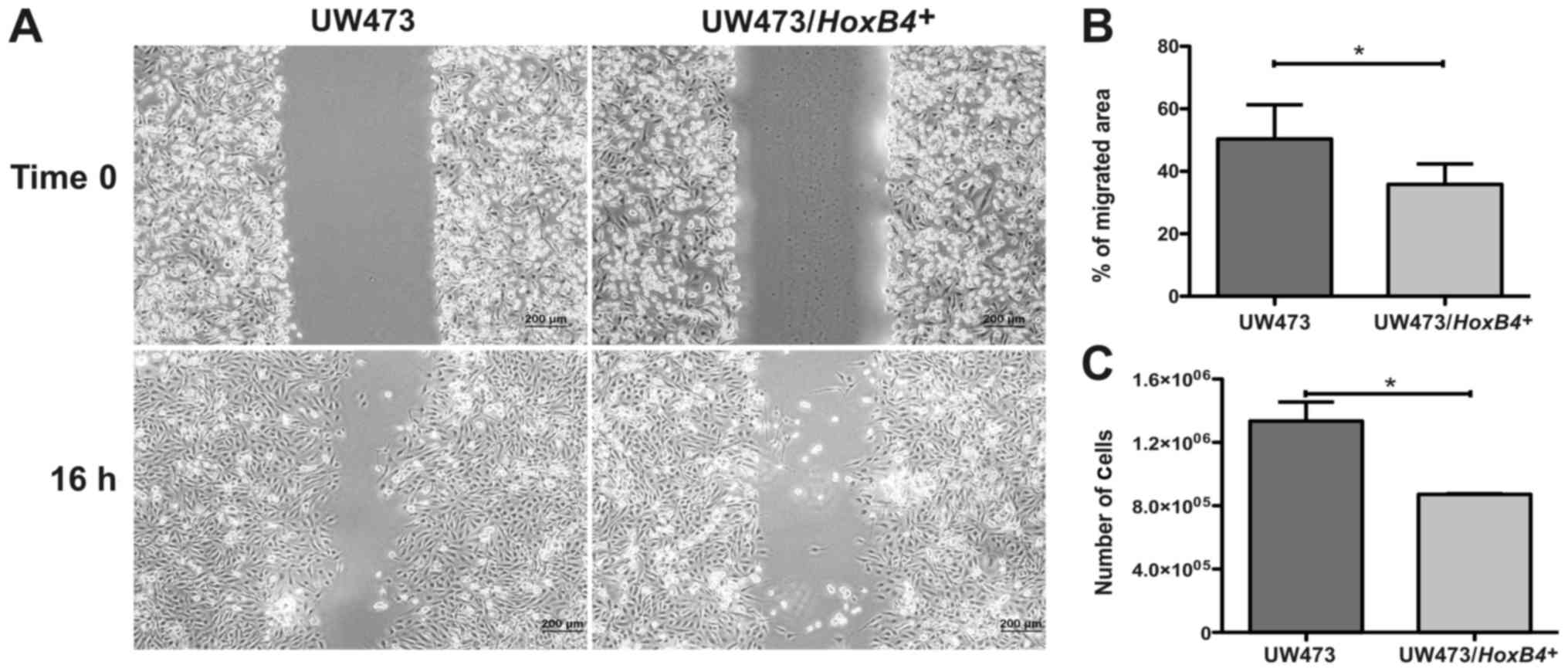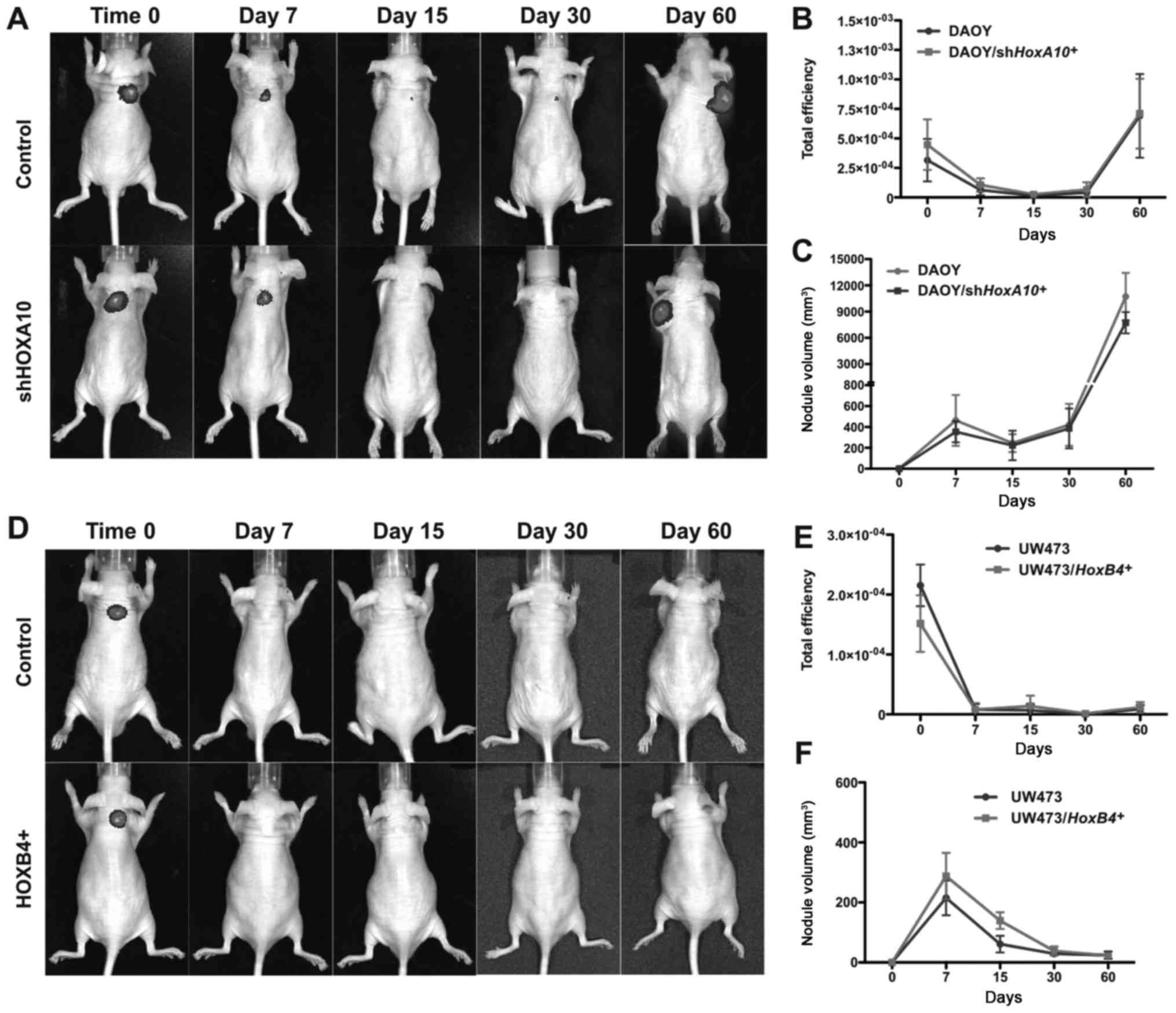|
1
|
Gilbertson RJ and Ellison DW: The origins
of medulloblastoma subtypes. Annu Rev Pathol. 3:341–365. 2008.
View Article : Google Scholar
|
|
2
|
Louis DN, Ohgaki H, Wiestler OD, Cavenee
WK, Burger PC, Jouvet A, Scheithauer BW and Kleihues P: The 2007
WHO classification of tumours of the central nervous system. Acta
Neuropathol. 114:97–109. 2007. View Article : Google Scholar : PubMed/NCBI
|
|
3
|
Garrè ML, Cama A, Bagnasco F, Morana G,
Giangaspero F, Brisigotti M, Gambini C, Forni M, Rossi A, Haupt R,
et al: Medulloblastoma variants: Age-dependent occurrence and
relation to Gorlin syndrome - a new clinical perspective. Clin
Cancer Res. 15:2463–2471. 2009. View Article : Google Scholar
|
|
4
|
Ramaswamy V, Remke M, Bouffet E, Bailey S,
Clifford SC, Doz F, Kool M, Dufour C, Vassal G, Milde T, et al:
Risk stratifi-cation of childhood medulloblastoma in the molecular
era: The current consensus. Acta Neuropathol. 131:821–831. 2016.
View Article : Google Scholar : PubMed/NCBI
|
|
5
|
Northcott PA, Dubuc AM, Pfister S and
Taylor MD: Molecular subgroups of medulloblastoma. Expert Rev
Neurother. 12:871–884. 2012. View Article : Google Scholar : PubMed/NCBI
|
|
6
|
Northcott PA, Shih DJ, Remke M, Cho YJ,
Kool M, Hawkins C, Eberhart CG, Dubuc A, Guettouche T, Cardentey Y,
et al: Rapid, reliable, and reproducible molecular sub-grouping of
clinical medulloblastoma samples. Acta Neuropathol. 123:615–626.
2012. View Article : Google Scholar :
|
|
7
|
Gibson P, Tong Y, Robinson G, Thompson MC,
Currle DS, Eden C, Kranenburg TA, Hogg T, Poppleton H, Martin J, et
al: Subtypes of medulloblastoma have distinct developmental
origins. Nature. 468:1095–1099. 2010. View Article : Google Scholar : PubMed/NCBI
|
|
8
|
Coluccia D, Figuereido C, Isik S, Smith C
and Rutka JT: Medulloblastoma: Tumor biology and relevance to
treatment and prognosis paradigm. Curr Neurol Neurosci Rep.
16:432016. View Article : Google Scholar : PubMed/NCBI
|
|
9
|
Khatua S: Evolving molecular era of
childhood medulloblastoma: Time to revisit therapy. Future Oncol.
12:107–117. 2016. View Article : Google Scholar
|
|
10
|
Parsons DW, Li M, Zhang X, Jones S, Leary
RJ, Lin JC, Boca SM, Carter H, Samayoa J, Bettegowda C, et al: The
genetic landscape of the childhood cancer medulloblastoma. Science.
331:435–439. 2011. View Article : Google Scholar :
|
|
11
|
Roy DM, Walsh LA and Chan TA: Driver
mutations of cancer epigenomes. Protein Cell. 5:265–296. 2014.
View Article : Google Scholar : PubMed/NCBI
|
|
12
|
Schuettengruber B, Martinez AM, Iovino N
and Cavalli G: Trithorax group proteins: Switching genes on and
keeping them active. Nat Rev Mol Cell Biol. 12:799–814. 2011.
View Article : Google Scholar : PubMed/NCBI
|
|
13
|
Wang VY and Zoghbi HY: Genetic regulation
of cerebellar development. Nat Rev Neurosci. 2:484–491. 2001.
View Article : Google Scholar : PubMed/NCBI
|
|
14
|
Ruddle FH: The role of Hox and Dlx gene
cluster in evolution and development. Inborn Errors of Development.
Epstein CJ, Erickson RP and Wynshaw-Boris A: Oxford University
Press; New York: pp. 653–658. 2008
|
|
15
|
Takahashi Y, Hamada J, Murakawa K, Takada
M, Tada M, Nogami I, Hayashi N, Nakamori S, Monden M, Miyamoto M,
et al: Expression profiles of 39 HOX genes in normal human adult
organs and anaplastic thyroid cancer cell lines by quantitative
real-time RT-PCR system. Exp Cell Res. 293:144–153. 2004.
View Article : Google Scholar : PubMed/NCBI
|
|
16
|
Hutlet B, Theys N, Coste C, Ahn MT,
Doshishti-Agolli K, Lizen B and Gofflot F: Systematic expression
analysis of Hox genes at adulthood reveals novel patterns in the
central nervous system. Brain Struct Funct. 221:1223–1243. 2016.
View Article : Google Scholar
|
|
17
|
Mallo M and Alonso CR: The regulation of
Hox gene expression during animal development. Development.
140:3951–3963. 2013. View Article : Google Scholar : PubMed/NCBI
|
|
18
|
Shah N and Sukumar S: The Hox genes and
their roles in oncogenesis. Nat Rev Cancer. 10:361–371. 2010.
View Article : Google Scholar : PubMed/NCBI
|
|
19
|
Quinonez SC and Innis JW: Human HOX gene
disorders. Mol Genet Metab. 111:4–15. 2014. View Article : Google Scholar
|
|
20
|
Wu X, Chen H, Parker B, Rubin E, Zhu T,
Lee JS, Argani P and Sukumar S: HOXB7, a homeodomain protein, is
overexpressed in breast cancer and confers epithelial-mesenchymal
transition. Cancer Res. 66:9527–9534. 2006. View Article : Google Scholar : PubMed/NCBI
|
|
21
|
Liao WT, Jiang D, Yuan J, Cui YM, Shi XW,
Chen CM, Bian XW, Deng YJ and Ding YQ: HOXB7 as a prognostic factor
and mediator of colorectal cancer progression. Clin Cancer Res.
17:3569–3578. 2011. View Article : Google Scholar : PubMed/NCBI
|
|
22
|
Wang Y, Dang Y, Liu J and Ouyang X: The
function of homeobox genes and lncRNAs in cancer. Oncol Lett.
12:1635–1641. 2016.PubMed/NCBI
|
|
23
|
Rodrigues MF, Esteves CM, Xavier FC and
Nunes FD: Methylation status of homeobox genes in common human
cancers. Genomics. 108:185–193. 2016. View Article : Google Scholar : PubMed/NCBI
|
|
24
|
Costa BM, Smith JS, Chen Y, Chen J,
Phillips HS, Aldape KD, Zardo G, Nigro J, James CD, Fridlyand J, et
al: Reversing HOXA9 oncogene activation by PI3K inhibition:
Epigenetic mechanism and prognostic significance in human
glioblastoma. Cancer Res. 70:453–462. 2010. View Article : Google Scholar : PubMed/NCBI
|
|
25
|
Tabuse M, Ohta S, Ohashi Y, Fukaya R,
Misawa A, Yoshida K, Kawase T, Saya H, Thirant C, Chneiweiss H, et
al: Functional analysis of HOXD9 in human gliomas and glioma cancer
stem cells. Mol Cancer. 10:602011. View Article : Google Scholar : PubMed/NCBI
|
|
26
|
Se YB, Kim SH, Kim JY, Kim JE, Dho YS, Kim
JW, Kim YH, Woo HG, Kim SH, Kang SH, et al: Underexpression of
HOXA11 is associated with treatment resistance and poor prognosis
in glioblastoma. Cancer Res Treat. 49:387–398. 2017. View Article : Google Scholar :
|
|
27
|
Munthe S, Sørensen MD, Thomassen M, Burton
M, Kruse TA, Lathia JD, Poulsen FR and Kristensen BW: Migrating
glioma cells express stem cell markers and give rise to new tumors
upon xenografting. J Neurooncol. 130:53–62. 2016. View Article : Google Scholar : PubMed/NCBI
|
|
28
|
Manohar CF, Salwen HR, Furtado MR and Cohn
SL: Up-regulation of HOXC6, HOXD1, and HOXD8 homeobox gene
expression in human neuroblastoma cells following chemical
induction of differentiation. Tumour Biol. 17:34–47. 1996.
View Article : Google Scholar : PubMed/NCBI
|
|
29
|
Zhang X, Hamada J, Nishimoto A, Takahashi
Y, Murai T, Tada M and Moriuchi T: HOXC6 and HOXC11 increase
transcription of S100beta gene in BrdU-induced in vitro
differentiation of GOTO neuroblastoma cells into Schwannian cells.
J Cell Mol Med. 11:299–306. 2007. View Article : Google Scholar : PubMed/NCBI
|
|
30
|
Chakravadhanula M, Ozols VV, Hampton CN,
Zhou L, Catchpoole D and Bhardwaj RD: Expression of the HOX genes
and HOTAIR in atypical teratoid rhabdoid tumors and other pediatric
brain tumors. Cancer Genet. 207:425–428. 2014. View Article : Google Scholar : PubMed/NCBI
|
|
31
|
Bodey B, Bodey B Jr, Siegel SE and Kaiser
HE: Immunocytochemical detection of the homeobox B3, B4, and C6
gene products in childhood medulloblastomas/primitive
neuroectodermal tumors. Anticancer Res. 20:1769–1780.
2000.PubMed/NCBI
|
|
32
|
Vo BT, Li C, Morgan MA, Theurillat I,
Finkelstein D, Wright S, Hyle J, Smith SMC, Fan Y, Wang YD, et al:
Inactivation of Ezh2 upregulates Gfi1 and drives aggressive
Myc-driven group 3 medulloblastoma. Cell Rep. 18:2907–2917. 2017.
View Article : Google Scholar : PubMed/NCBI
|
|
33
|
Margueron R and Reinberg D: The Polycomb
complex PRC2 and its mark in life. Nature. 469:343–349. 2011.
View Article : Google Scholar : PubMed/NCBI
|
|
34
|
Hanahan D and Weinberg RA: Hallmarks of
cancer: The next generation. Cell. 144:646–674. 2011. View Article : Google Scholar : PubMed/NCBI
|
|
35
|
Castro-Gamero AM, Borges KS, Lira RC,
Andrade AF, Fedatto PF, Cruzeiro GA, Silva RB, Fontes AM, Valera
ET, Bobola M, et al: Chromosomal heterogeneity and instability
characterize pediatric medulloblastoma cell lines and affect
neoplastic phenotype. Cytotechnology. 65:871–885. 2013. View Article : Google Scholar : PubMed/NCBI
|
|
36
|
Jacobsen PF, Jenkyn DJ and Papadimitriou
JM: Establishment of a human medulloblastoma cell line and its
heterotransplantation into nude mice. J Neuropathol Exp Neurol.
44:472–485. 1985. View Article : Google Scholar : PubMed/NCBI
|
|
37
|
Yamada M, Shimizu K, Tamura K, Okamoto Y,
Matsui Y, Moriuchi S, Park K, Mabuchi E, Yamamoto K, Hayakawa T, et
al: Establishment and biological characterization of human
medulloblastoma cell lines. No To Shinkei. 41:695–702. 1989.In
Japanese. PubMed/NCBI
|
|
38
|
Ivanov DP, Coyle B, Walker DA and
Grabowska AM: In vitro models of medulloblastoma: Choosing the
right tool for the job. J Biotechnol. 236:10–25. 2016. View Article : Google Scholar : PubMed/NCBI
|
|
39
|
de Oliveira GP, Alves CJ and Chadi G:
Early gene expression changes in spinal cord from
SOD1G93A Amyotrophic Lateral Sclerosis animal model.
Front Cell Neurosci. 7:2162013.
|
|
40
|
Covas DT, Panepucci RA, Fontes AM, Silva
WA Jr, Orellana MD, Freitas MC, Neder L, Santos AR, Peres LC, Jamur
MC, et al: Multipotent mesenchymal stromal cells obtained from
diverse human tissues share functional properties and
gene-expression profile with CD146+ perivascular cells
and fibroblasts. Exp Hematol. 36:642–654. 2008. View Article : Google Scholar : PubMed/NCBI
|
|
41
|
Fontes AM, Melo FU, Greene LJ, Faça VM,
Lin Y, Gerson SL and Covas DT: Production of human factor VIII-FL
in 293T cells using the bicistronic MGMT(P140K)-retroviral vector.
Genet Mol Res. 11:775–789. 2012. View Article : Google Scholar : PubMed/NCBI
|
|
42
|
Albesiano E, Messmer BT, Damle RN, Allen
SL, Rai KR and Chiorazzi N: Activation-induced cytidine deaminase
in chronic lymphocytic leukemia B cells: Expression as multiple
forms in a dynamic, variably sized fraction of the clone. Blood.
102:3333–3339. 2003. View Article : Google Scholar : PubMed/NCBI
|
|
43
|
Ferguson RE, Carroll HP, Harris A, Maher
ER, Selby PJ and Banks RE: Housekeeping proteins: A preliminary
study illustrating some limitations as useful references in protein
expression studies. Proteomics. 5:566–571. 2005. View Article : Google Scholar : PubMed/NCBI
|
|
44
|
Thomé CH, dos Santos GA, Ferreira GA,
Scheucher PS, Izumi C, Leopoldino AM, Simão AM, Ciancaglini P, de
Oliveira KT, Chin A, et al: Linker for activation of T-cell family
member2 (LAT2) a lipid raft adaptor protein for AKT signaling, is
an early mediator of alkylphospholipid anti-leukemic activity. Mol
Cell Proteomics. 11:1898–1912. 2012. View Article : Google Scholar : PubMed/NCBI
|
|
45
|
Palma CS, Grassi ML, Thomé CH, Ferreira
GA, Albuquerque D, Pinto MT, Ferreira Melo FU, Kashima S, Covas DT,
Pitteri SJ, et al: Proteomic analysis of epithelial to mesenchymal
transition (EMT) reveals cross-talk between SNAIL and HDAC1
proteins in breast cancer cells. Mol Cell Proteomics. 15:906–917.
2016. View Article : Google Scholar :
|
|
46
|
Triscott J, Lee C, Foster C, Manoranjan B,
Pambid MR, Berns R, Fotovati A, Venugopal C, O'Halloran K,
Narendran A, et al: Personalizing the treatment of pediatric
medulloblastoma: Polo-like kinase 1 as a molecular target in
high-risk children. Cancer Res. 73:6734–6744. 2013. View Article : Google Scholar : PubMed/NCBI
|
|
47
|
Bobola MS, Silber JR, Ellenbogen RG, Geyer
JR, Blank A and Goff RD: O6-methylguanine-DNA
methyltransferase, O6-benzylguanine, and resistance to
clinical alkylators in pediatric primary brain tumor cell lines.
Clin Cancer Res. 11:2747–2755. 2005. View Article : Google Scholar : PubMed/NCBI
|
|
48
|
Murat A, Migliavacca E, Gorlia T, Lambiv
WL, Shay T, Hamou MF, de Tribolet N, Regli L, Wick W, Kouwenhoven
MC, et al: Stem cell-related 'self-renewal' signature and high
epidermal growth factor receptor expression associated with
resistance to concomitant chemoradiotherapy in glioblastoma. J Clin
Oncol. 26:3015–3024. 2008. View Article : Google Scholar : PubMed/NCBI
|
|
49
|
Kurscheid S, Bady P, Sciuscio D, Samarzija
I, Shay T, Vassallo I, Criekinge WV, Daniel RT, van den Bent MJ,
Marosi C, et al: Chromosome 7 gain and DNA hypermethylation at the
HOXA10 locus are associated with expression of a stem cell related
HOX-signature in glioblastoma. Genome Biol. 16:162015. View Article : Google Scholar : PubMed/NCBI
|
|
50
|
Perkins EJ, Bao W, Guan X, Ang CY,
Wolfinger RD, Chu TM, Meyer SA and Inouye LS: Comparison of
transcriptional responses in liver tissue and primary hepatocyte
cell cultures after exposure to
hexahydro-1,3,5-trinitro-1,3,5-triazine. BMC Bioinformatics.
7(Suppl 4): S222006. View Article : Google Scholar
|
|
51
|
Snuderl M, Batista A, Kirkpatrick ND, Ruiz
de Almodovar C, Riedemann L, Walsh EC, Anolik R, Huang Y, Martin
JD, Kamoun W, et al: Targeting placental growth factor/neuropilin 1
pathway inhibits growth and spread of medulloblastoma. Cell.
152:1065–1076. 2013. View Article : Google Scholar : PubMed/NCBI
|
|
52
|
Sengupta S, Weeraratne SD, Sun H, Phallen
J, Rallapalli SK, Teider N, Kosaras B, Amani V, Pierre-Francois J,
Tang Y, et al: α5-GABAA receptors negatively regulate MYC-amplified
medulloblastoma growth. Acta Neuropathol. 127:593–603. 2014.
View Article : Google Scholar
|
|
53
|
Tang W, Jiang Y, Mu X, Xu L, Cheng W and
Wang X: MiR-135a functions as a tumor suppressor in epithelial
ovarian cancer and regulates HOXA10 expression. Cell Signal.
26:1420–1426. 2014. View Article : Google Scholar : PubMed/NCBI
|
|
54
|
Hemmesi K, Squadrito ML, Mestdagh P, Conti
V, Cominelli M, Piras IS, Sergi LS, Piccinin S, Maestro R, Poliani
PL, et al: miR-135a inhibits cancer stem cell-driven
medulloblastoma development by directly repressing Arhgef6
expression. Stem Cells. 33:1377–1389. 2015. View Article : Google Scholar : PubMed/NCBI
|















